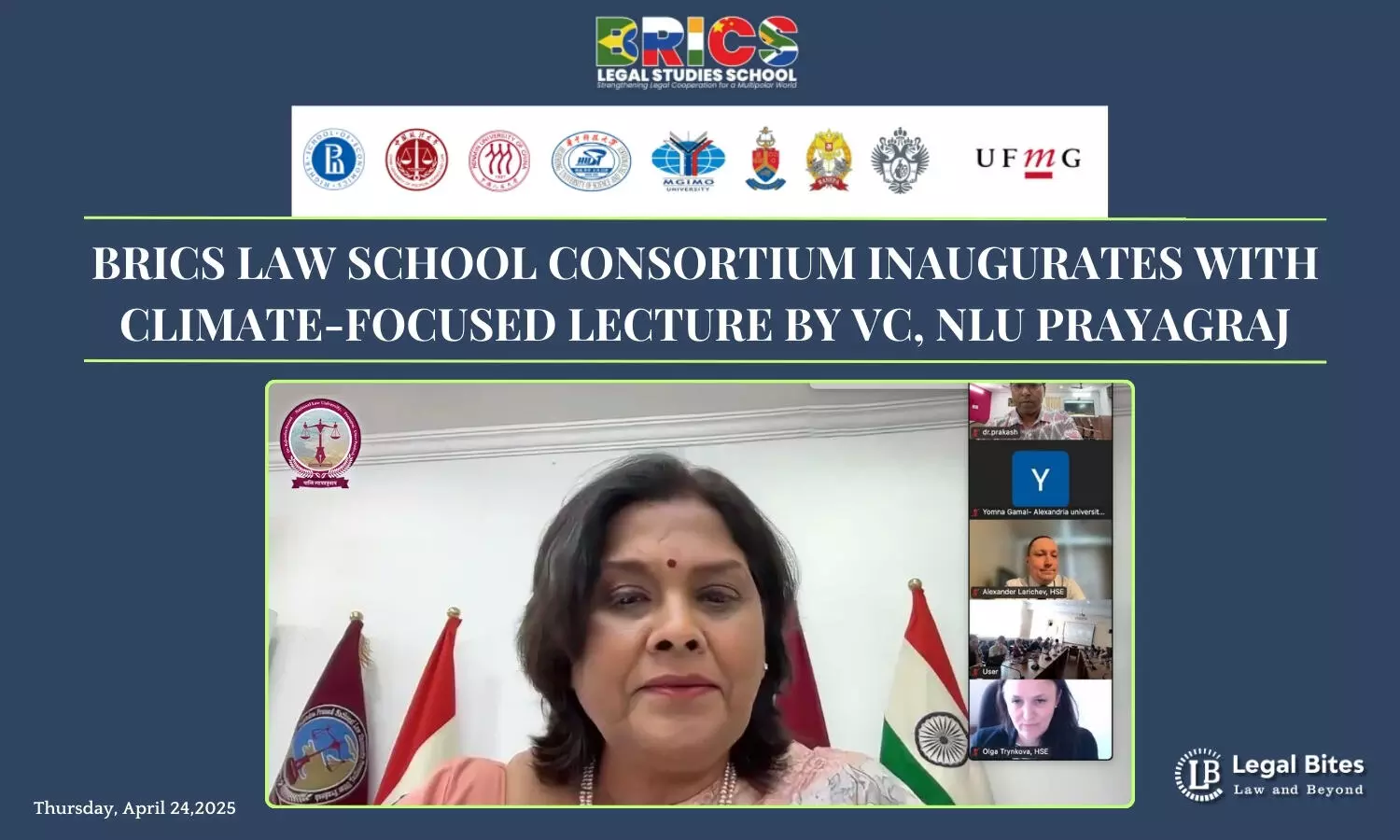
Prof. (Dr.) Usha Tandon delivers Insightful Keynote on BRICS and Climate Commitments; Leaders from Brazil, Russia, India, China, South Africa, Egypt, and Ethiopia Participate
The BRICS Law Schools Consortium marked its academic debut on 25 April 2025 with an inaugural lecture by Sr. Prof. (Dr.) Usha Tandon, Hon’ble Vice Chancellor of Dr. Rajendra Prasad National Law University, Prayagraj. The lecture, delivered virtually, revolved around the pressing theme “BRICS at Crossroads: Mapping BRICS Commitments to Climate Change Mitigation.”
Joined by delegates from BRICS nations—including Brazil, Russia, India, China, South Africa—as well as Egypt and Ethiopia, the session provided an intellectual arena for legal scholars and policy experts to explore the nuanced intersection of climate law, development, and cross-border cooperation.
Highlights of Prof. Tandon’s Address
Prof. Tandon’s keynote traced the historical trajectory of BRICS and its collective journey in confronting climate challenges. Citing frameworks such as the Paris Agreement and the Johannesburg Declaration, she underlined the critical role of Common but Differentiated Responsibilities (CBDR) and the need for climate equity tailored to developing economies.
She stressed that BRICS nations must reconcile ambitious climate goals with ongoing developmental imperatives, advocating for global accountability that takes into account regional realities. She also spotlighted India’s proactive role, referencing landmark initiatives like the National Solar Mission, clean energy expansion, and sustainable mobility schemes as models of climate leadership within the consortium.
Role of the New Development Bank (NDB)
A substantial portion of the lecture was devoted to the New Development Bank (NDB), established by BRICS to support sustainable infrastructure. Prof. Tandon urged that NDB investments be directed toward projects that ensure inclusivity, climate resilience, and long-term environmental balance, aligning with the twin objectives of progress and preservation.
Strengthening Legal Frameworks and Collaboration
Prof. Tandon called for reinforced legal and institutional mechanisms, emphasizing the necessity of academic exchange, youth engagement, and transnational cooperation in the legal domain. She concluded by noting the Consortium’s potential to inspire critical discourse and joint innovation across legal academia in BRICS nations.
International Acknowledgment and Encouragement
Echoing the lecture’s impact, Ms. Galkina Nataliia, Deputy Director at the Institute of National and Comparative Legal Studies, HSE, Moscow, remarked:
“We had the pleasure of hearing a lecture by Prof. (Dr.) Usha Tandon, who sparked great interest among the audience with her insights on climate change. We express our sincere gratitude to Prof. Tandon for her excellent contribution and look forward to the launch of other exciting initiatives in the near future.”
Adding to the praise, Olga Trynkova, Director, International Cooperation Centre, Faculty of Law, HSE University, Moscow, said:
“This initiative represents an exciting opportunity to unite academic minds across BRICS nations. Prof. (Dr.) Usha Tandon’s erudite and thought-provoking lecture was a true inspiration, blending incisive analysis with actionable insights.”
In her concluding note, Prof. Tandon shared her optimism:
“I am deeply pleased with this meaningful initiative, which has the potential to foster dynamic discussions among academicians of the BRICS nations. I firmly believe it will serve as a catalyst for innovative collaborations and critical thought on shared global challenges.”
Setting the Stage for Future Engagement
With its successful inaugural event, the BRICS Law Schools Consortium has laid a robust foundation for continued interdisciplinary engagement. The lecture not only emphasized the urgency of aligning legal frameworks with climate objectives but also showcased the intellectual leadership of Indian academia in shaping global discourse.